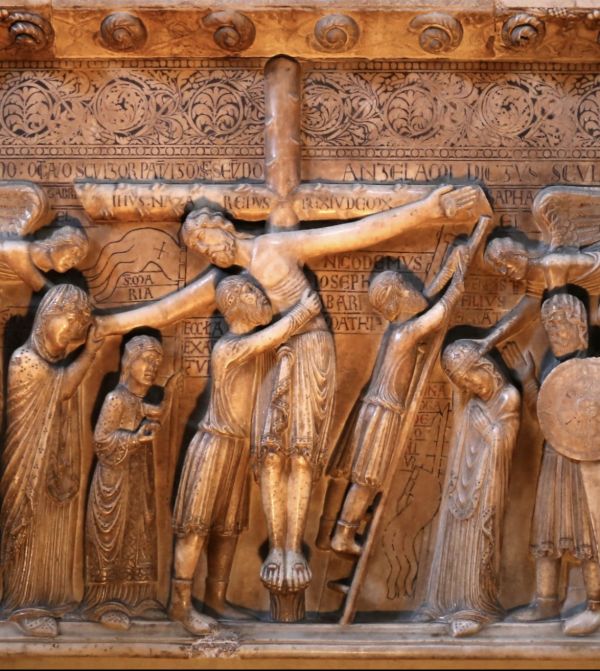Holy Saturday, a day of silent waiting, was for Francis and Clare an occasion of special unity with Mary, the Mother of Jesus, who lived all the mysteries of redemption with Him.
Like Francis, Clare participated "in symbiosis" with Christ in his Passion.
In contemplation she was given to experience the Paschal Mystery of the Bridegroom, knowing the depth of His martyrdom.
Motionless and beside herself since Holy Thursday, she arrived at Holy Saturday with an unspeakable 'Christ-like unity'.
We read in the Sources valuable passages in this regard:
"Then coming the night after Friday, the devout daughter lit a candle and with a nod, not words, reminded her Mother of the command of St Francis.
In fact, the Saint had ordered her not to let a single day pass without food.
And as she stood before her, Clare, as if returning from another place, uttered these words:
"What need is there of the candle? Is it not day?".
"Mother," she replies, "the day has passed and another night has returned.
And to her Clare said:
"Blessed be this sleep, dearest daughter; for, after having so longed for it, it has been given to me as a gift.
But beware of telling anyone about this sleep as long as I live in this body'" (FF 3217).
At the moment of her farewell, as 'Altera-Maria' she lived with her heart always at the foot of the cross and in faith, amidst the tears of her desolate daughters.
And turning to her soul she said:
"Go, safe," he says to her, "for you have a good escort on the journey. Go, for He who created you, has sanctified you, and always looking upon you as a mother his son, has loved you with tender love".
"And you, Lord," she added, "be blessed, who created me".
Asked by one of the sisters to whom she was speaking, she replied:
"I speak to my blessed soul "*.
And now that glorious escort was not far off.
Turning in fact to a daughter, he asks her:
"Do you see the King of glory, whom I see, O daughter?
Clare was now close to passing from this world to the Father, when one of her daughters, on whom the Spirit of the Lord rested, saw, with the eyes of the body, this beatifying vision:
"Pierced indeed by the dart of deep sorrow, she turns her gaze towards the door of the house: and behold, a host of virgins in white robes enters, and all have garlands of gold on their heads.
One more resplendent than the others advances among them, from whose crown, which appears at the top like a pierced thurible, radiates such splendour that the darkness of the night within the walls of the house is turned into daylight.
She approaches the little bed where the Bride of the Son lies and, bending over her with tender love, gives her a most sweet embrace.
The virgins spread out a pallium of marvellous beauty and, all serving in competition, clothed Clare's body and adorned her thalamus" (FF 3253).
The Virgin Mary, the Mother of Jesus, She who had lived with the poor woman on Holy Saturday, had come to take her to her glorious, crucified and risen Son.
A dawning full of expectation, and pregnant - in the power of the Spirit.
«Do not be afraid, you; for I know that you seek Jesus, the crucified. He is not here [...]» (Mt 28:5-6a).
«Who shall roll away the stone from the door of the sepulchre?» (Mk 16:3).
«The Son of Man must be delivered into the hands of sinful men and be crucified and on the third day rise again» (Lk 24:7).
* It is the night between the Friday and Saturday before Clare's death, that is, the night between 8 and 9 August 1253.
Holy Saturday - Easter Vigil (Mt 28,1-10); (Mk 16,1-7); (Lk 24,1-12).












